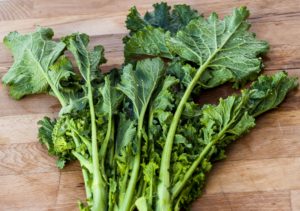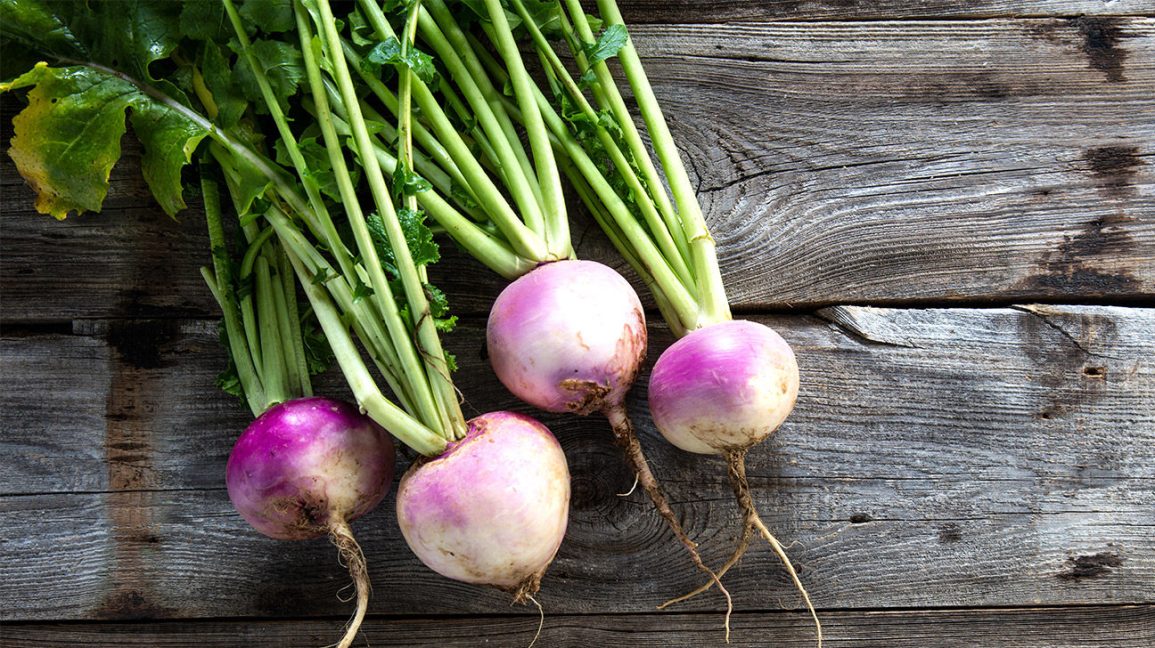Health Benefits of Eating Turnips
As one of the foods for the musculoskeletal system, benefits of eating turnips are quite massive since it is a calcium-rich leaves.
Turnips were consumed almost on a daily in Germany centuries ago and even in this modern age. Fermented cabbage and turnips seem to be the only vegetables available during cold Central European winters.
Although, it appears to have been neglected, may be due to the fact that some believe it has little nutritional value.
SEE ALSO: Healthy foods that help during hemorrhage
However, the root, the leaves or turnip greens are back on stage today as their composition (nutritional value) and therapeutic properties are now known.
Other names:
French: Navet chou-rave
Spanish: Nabo, colinabo
German: Herbstrübe

Both the root and leaves of turnip plant (‘Brassica rapa’ L.) belong to the botanical family – Cruciferae.
Since it is a tuberous root and not a tuber, it does not have sprouts as does the potato.
They are native to Germany, the Mediterranean coast of Southern Europe and also in the Southern United States of America.
This is because they do well in cold climates.
Turnip Composition
This is based on per 100 grams of raw edible portion of turnip.
Energy = 27.0 kcal = 114 kj
Carbohydrates = 4.43 g
Protein = 0.900 g
Fiber = 1.80 g
Vitamin A = __
(Turnip greens contains Vitamin A = 760 µg RE)
Vitamin B1 = 0.040 mg
Vitamin B2 = 0.030 mg
Niacin = 0.550 mg NE
Vitamin B6 = 0.090 mg
Folate = 14.5 µg
Vitamin B12 = __
Vitamin C = 21.0 mg
Vitamin E = 0.030 mg α-TE
Calcium = 30.0 mg
Magnesium = 11.0 mg
Phosphorus = 27.0 mg
Iron = 0.300 mg
Potassium = 191 mg
Zinc = 0.270 mg
Saturated Fat = 0.011 g
Total Fat = 0.100 g
Cholesterol = __
Sodium = 67.0 mg
Percentage composition
Fiber = 1.80%
Carbohydrates = 4.43%
Fat = 0.100%
Protein = 0.900%
Minerals = 0.700%
Water = 91.9%
This information is based on % daily value provided by 100 grams of turnip
Properties and Indications of Turnip
The turnip contains more water than the potato (92% compared to that of potato 79%).
However, the energy-producing potential of turnips is somewhat reduced: fats, 0.1%; carbohydrates, 4.43%; proteins 0.9%.
The turnip also holds significant amounts B complex vitamins (B1, B2, B6, niacin and folates). There’s an abundance of vitamin C which proffers enormous benefits of eating turnips.
100 grams of turnip makes available 21 mg of vitamin C. As it is, turnips lack provitamin A, vitamin E, and B12 while turnip greens contains provitamin A (beta-carotene).
In terms of mineral content, potassium is the most abundant (191 mg per 100 grams) followed by sodium which has about 67 mg per 100/grams.
One of the benefits of eating turnips is that it also contains small amount of calcium, making it one of the calcium-rich leaves. Turnips contain phosphorus, iron and some trace elements.
YOU MAY LIKE: Amazing Health Benefits of Eating Okra (Lady’s finger)
Turnips are quite high in fiber (1.8%). As a whole it provides little energy and virtually has no fat.
The following points show the benefits of eating turnips
- Turnips are alkalizing
- Blood purifying (depurant)
- They are quite diuretic
Indications regarding the benefits of eating turnips
The following are some of the therapeutic indications regarding the benefits of eating turnips. They are:
- Gout (uratic arthritis)
- Obesity
Gout
As stated above, one of the benefits of eating turnips is that it helps facilitate urinary elimination of the uric acid which comes as result of the body’s means of metabolizing proteins.

Toxic state is produced in the body due to an excess of the substance mentioned above, where uric acid crystals are deposited especially in the joints region thereby causing inflammation and a severe rheumatic pain.
Consuming turnips helps cleanse the blood of uric acid and other metabolic remains.
They are highly recommended for those suffering from gout because they provide relief. Individuals suffering from rheumatic pain are encouraged to eat turnips.
Obesity
Turnips make available a considerable feeling of satiety. This is because they are packed with components effective enough in weight loss diet. Again, they are easily digested and lacking fat.
Other Health Benefits
The following are some other health benefits of eating turnips.
- They are good for cancer prevention. This is because they have glucosinolates; they are plant-based chemicals that fight against all types of cancer such as prostate and breast cancers, according to pritikin.
- They are good for the eye health because they are rich in antioxidant lutein. They fight against cataracts and macular degeneration.
- Good for bone health because they contain significant amount of calcium which the heart, nerves and muscles require in order to function properly.
Turnip Greens
The turnips greens are seen as the most calcium-rich of the green vegetables and quite nutritious than the regular turnips. The amazing fact is that turnip greens make available twice the proteins and fiber.
However, with fewer carbohydrates, they have outstanding nutritional value in their concentration of vitamins and minerals. They are rich in calcium, beta-carotene, vitamin C, iron and folates.

Although, the turnip greens contains oxalic acid but they are good source of calcium (plant-based).
Therefore, increasing the intake of this mineral is one of the benefits of eating turnips as well as turnip greens.
The following are the percentage composition of turnip greens.
Fiber = 3.20%
Carbohydrates = 2.53%
Protein = 1.50%
Minerals = 1.40%
Fat = 0.300%
Water = 91.1%
Preparation and Use
- Fresh leaves: They are eaten raw in salads
- Root: They are eaten cooked and can be accompanied by rice and legumes dishes.
Warning!
For persons with normal thyroid function, eating turnips on the regular poses no risk or threats.
However, consuming turnips are NOT recommended for those with diminished thyroid function.

A graduate of Computer Science and Information Management Technology. Diploma – Caregiving, Certificates – Dementia and Diabetes Awareness and Management. A researcher, blogger, songwriter, singer and acoustic guitarist. Born in an environment where natural talents such as healing are imparted at our natural birth. This natural talents of healing is the result of our genetic inheritance and the training from family environment.



















